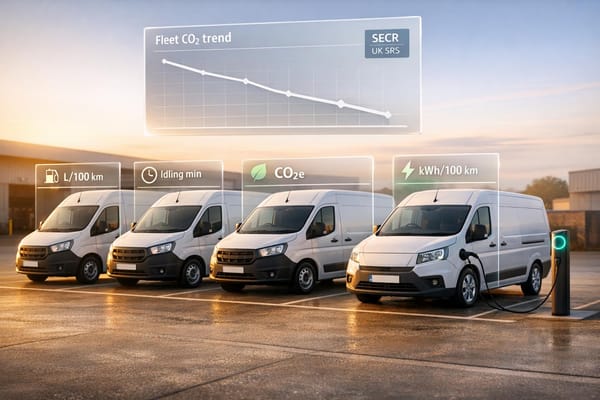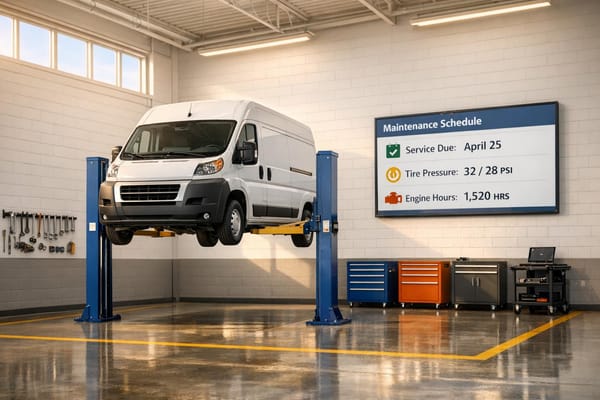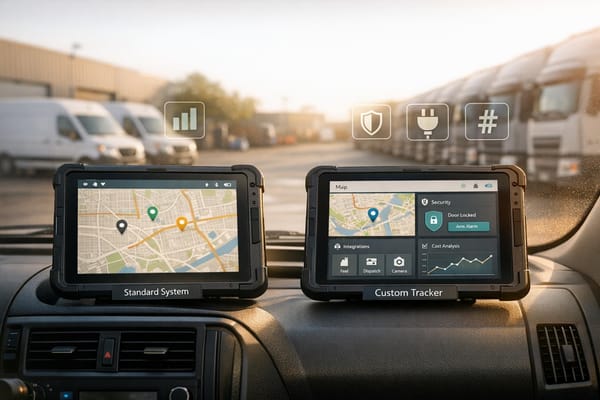Best GPS Trackers vs Telematics Systems for Fleets
Explore the differences between GPS trackers and telematics systems for fleet management, and determine which solution fits your business needs.
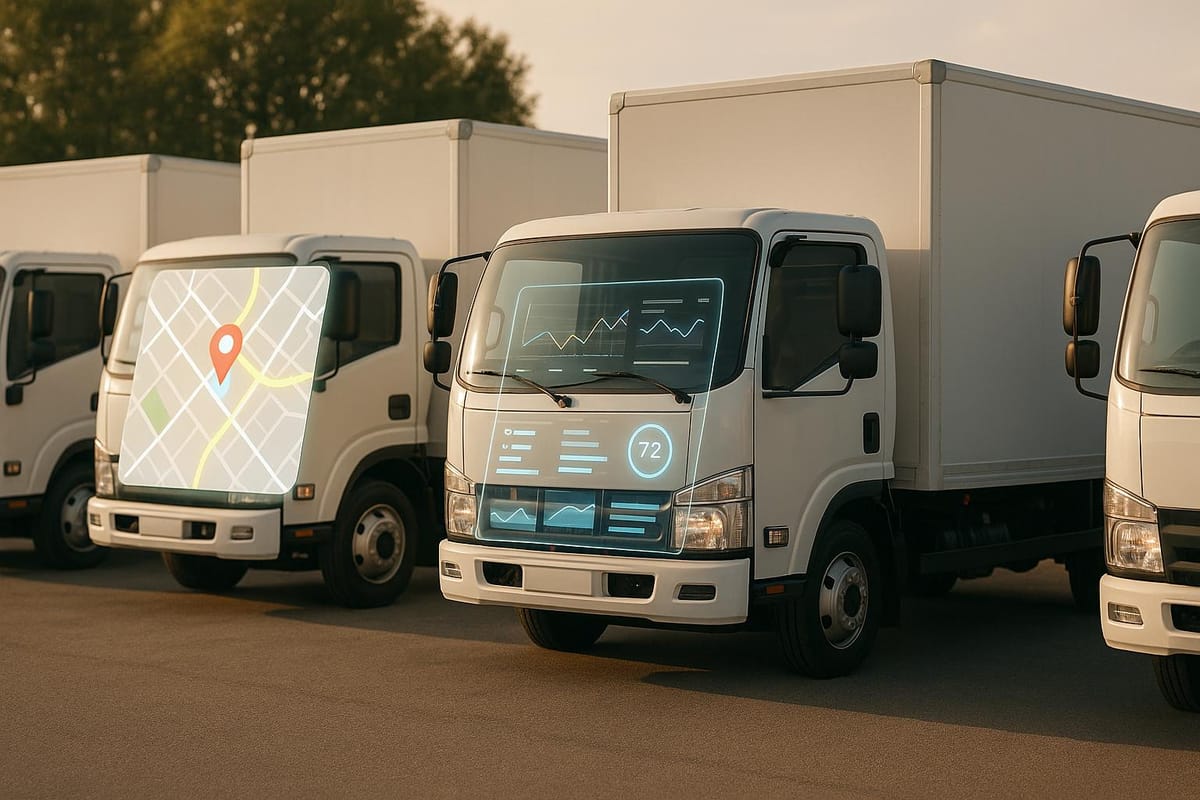
Struggling to decide between GPS trackers and telematics systems for your fleet? Here's a quick breakdown:
- GPS Trackers: Simple and cost-effective. Ideal for smaller fleets (5-20 vehicles) that need basic location tracking, theft prevention, and geofencing. Prices start at approximately £7.99 per vehicle per month.
- Telematics Systems: Advanced tools with features like vehicle diagnostics, driver behaviour monitoring, fuel analysis, and compliance support. Best for larger or more complex fleets requiring detailed insights and long-term savings.
Quick Comparison Table:
| Feature | GPS Trackers | Telematics Systems |
|---|---|---|
| Primary Function | Location tracking and theft alerts | Fleet management with analytics |
| Data Collected | Location, speed, movement | Diagnostics, behaviour, fuel usage |
| Installation | Plug-and-play or basic hardwiring | Usually requires professional setup |
| Cost | Lower (£7.99/month) | Higher, reflecting advanced tools |
| Ideal Fleet Size | Small (5-20 vehicles) | Large or complex fleets |
| Compliance Support | Limited | Strong (e.g., driver hours, MOT) |
For smaller operations or budget-conscious businesses, GPS trackers get the job done. But if you're managing a larger fleet or want deeper insights to improve efficiency, telematics systems are the way forward. Both options offer theft protection and help streamline operations, but your choice should align with your fleet's size, needs, and goals.
GPS Tracking vs Telematics. Know what you need. #gpstracking #telematics #fleet
GPS Trackers: Features and Applications
Building on the basics of fleet tracking, GPS trackers play a key role in straightforward vehicle monitoring. They provide essential location services for everyday fleet management, offering a practical and budget-friendly solution for many UK businesses. Their simplicity and cost-effectiveness make them particularly appealing to companies navigating tight budgets and compliance requirements.
Main Features of GPS Trackers
At the heart of every GPS tracker is real-time location tracking. These devices deliver live updates on vehicle positions, typically refreshing every 10 to 30 seconds, depending on the model. Fleet managers can access this data through web-based platforms or mobile apps, enabling instant visibility of their vehicles' whereabouts.
Route history and playback is another valuable feature, allowing you to review a vehicle’s travel history over specific periods. This can help confirm job completions, address customer complaints, or optimise routes. Most systems store this data for anywhere between 90 days and 12 months, ensuring ample time for review.
Geofencing technology creates virtual boundaries around designated areas. Whenever a vehicle enters or exits these zones, the system sends alerts via email or SMS. Businesses in the UK often use geofencing to monitor site arrivals, detect unauthorised use outside working hours, or ensure vehicles remain within operational limits.
Speed monitoring and alerts are designed to promote road safety and compliance. Notifications are triggered when drivers exceed set speed limits, whether these are national limits or internal company policies. This feature is particularly appealing for insurance purposes, as some insurers offer discounts to fleets that actively monitor speeding.
For added security, movement and tamper alerts notify managers of unexpected activity, such as a vehicle moving during off-hours or attempts to tamper with the device. These alerts play a key role in theft prevention and recovery efforts.
These core features demonstrate how basic GPS trackers can meet the needs of businesses without requiring advanced systems.
When to Use GPS Trackers
GPS trackers are particularly suited to smaller fleets with straightforward tracking needs. If your fleet consists of 5 to 20 vehicles and your priority is knowing their locations and ensuring proper usage, GPS trackers provide a simple, cost-effective solution without unnecessary extras.
Construction and trade businesses often find GPS trackers a perfect fit. These companies typically need to monitor high-value equipment, confirm site attendance, and safeguard tools and materials stored in vehicles overnight. The straightforward functionality of GPS trackers aligns well with these goals, focusing on asset location and theft prevention rather than detailed analytics.
Theft recovery is another major advantage of GPS trackers in the UK. With commercial vehicle theft costing businesses millions annually, these devices act as both a deterrent and a recovery tool. By providing real-time location data to law enforcement, GPS trackers significantly improve recovery rates compared to vehicles without tracking systems.
For service-based businesses - like cleaning companies, maintenance providers, or delivery firms - GPS trackers meet the need for job verification. These businesses often bill customers based on attendance rather than performance metrics, making the simplicity of GPS tracking an ideal choice.
Cost-sensitive businesses also benefit from the affordability of GPS trackers. With basic services starting at around £7.99 per vehicle per month, these systems are a practical option for start-ups and small businesses aiming to enhance fleet management without breaking the bank.
Lastly, GPS trackers are a good fit for businesses where driver privacy is a priority. Unlike more advanced systems that analyse driver behaviour in detail, GPS trackers focus purely on vehicle location. This balance can help maintain trust with staff while still providing essential oversight and security.
Telematics Systems: Advanced Fleet Management Features
GPS trackers are great for pinpointing a vehicle's location, but telematics systems take things several steps further. They combine location tracking with diagnostics, driver behaviour analysis, and operational data. For UK businesses managing large or complex fleets, telematics systems provide the detailed insights needed to improve efficiency and performance.
Unlike GPS trackers, which focus solely on location, telematics systems dive into vehicle health and maintenance. This extra layer of data is especially valuable for organisations where smooth operations directly impact profitability. Let’s explore some of the standout features that make telematics a game-changer.
Advanced Telematics Features
Vehicle diagnostics and predictive maintenance are at the heart of telematics systems. By connecting to a vehicle's onboard computer, these platforms monitor everything from engine performance to brake wear and fuel consumption. They flag issues early, allowing fleet managers to address potential problems before they escalate into costly breakdowns. For UK fleets, this proactive approach not only keeps vehicles roadworthy but also ensures compliance with MOT requirements - critical for avoiding unexpected downtime.
Driver behaviour monitoring goes beyond tracking location. It analyses driving patterns like acceleration, braking, and cornering, providing performance scorecards that highlight areas for improvement. This data can also reduce costs, as insurers often offer lower premiums for fleets with strong safety records based on real driving data.
Fuel efficiency tracking and analysis is another major benefit. Telematics systems link fuel usage to driving habits, route choices, and even vehicle load. By identifying costly behaviours like excessive idling or aggressive driving, businesses can cut fuel expenses - one of the biggest costs in long-haul operations. Recognising and rewarding drivers who consistently achieve better fuel economy can also support targeted training initiatives across the fleet.
Integration capabilities set telematics systems apart from standalone GPS trackers. These platforms can sync with existing business tools like customer relationship management (CRM) systems, invoicing software, and workforce management platforms. This seamless connection eliminates duplicate data entry and ensures that information like vehicle location, job completion, and billing stays aligned. For UK fleet managers, this level of integration simplifies operations and boosts efficiency.
These features translate into tangible benefits, particularly for long-haul fleets.
Advantages for UK Long-Haul Fleets
Long-haul operations face unique challenges, and telematics systems are particularly well-suited to tackle them. Driver hours compliance is a top priority, especially with strict DVSA regulations. Telematics can automatically track driving hours, break times, and rest periods, issuing alerts before legal limits are exceeded. It also maintains accurate records, making compliance audits far less stressful.
Route optimisation is another standout feature. By analysing historical traffic patterns, current road conditions, and vehicle-specific factors like weight limits or low bridges, telematics systems suggest the most efficient routes. This not only saves time and fuel but also helps businesses avoid fines for non-compliance with road restrictions.
Remote vehicle monitoring is invaluable for fleets operating far from their home base. Real-time updates on vehicle health allow managers to address potential issues before they lead to breakdowns - a crucial capability for operations in remote or rural parts of the UK.
Customer service improvement is an often-overlooked benefit. Features like accurate arrival time predictions, delay notifications, and proof of delivery enhance the customer experience. For businesses competing on service quality, these tools can make a real difference in building trust and loyalty.
Telematics data also provides a big-picture view of fleet performance. By benchmarking routes, drivers, and vehicles, fleet managers can identify best practices and apply them across the operation. This continuous improvement helps businesses stay competitive while boosting overall efficiency.
For UK companies managing mixed fleets or catering to diverse markets, telematics systems offer the flexibility to adapt to various needs. While the upfront cost might be higher than basic GPS trackers, the long-term savings and operational benefits often make the investment worthwhile for larger fleets.
GPS Trackers vs Telematics Systems: Main Differences
When it comes to managing your fleet, understanding the operational differences between GPS trackers and telematics systems is essential. Both technologies are designed to support fleet management, but they operate at different levels of complexity and provide varying degrees of data. Here's a closer look at how they compare.
GPS trackers focus on real-time location tracking, geofencing alerts, and basic movement monitoring, making them a straightforward solution with minimal setup.
Telematics systems, on the other hand, go far beyond location tracking. They include features like engine diagnostics, driver behaviour analysis, fuel consumption tracking, and integration with business systems. While GPS trackers provide basic directional tracking, telematics systems deliver a complete overview of vehicle and operational performance.
Feature and Benefit Comparison
The table below highlights the key differences between GPS trackers and telematics systems:
| Aspect | GPS Trackers | Telematics Systems |
|---|---|---|
| Primary Function | Tracks location and movement | Manages fleet with diagnostics and analytics |
| Data Collection | Location, speed, and movement | Vehicle diagnostics, driver behaviour, fuel usage, and maintenance alerts |
| Installation Complexity | Easy plug-and-play or basic hardwiring | Professional installation often required |
| Monthly Cost | Lower fees | Higher costs reflecting advanced features |
| Ease of Use | Minimal training needed | Additional training recommended for full functionality |
| Reporting Capabilities | Basic location and movement reports | Advanced analytics, custom dashboards, and operational insights |
| Integration Options | Limited third-party compatibility | Extensive integration with business systems |
| Ideal Fleet Size | Best for small fleets | Suited for large or complex fleets |
| Return on Investment | Quick return through simple tracking | Long-term savings via operational improvements |
This comparison makes it clear that GPS trackers excel in simplicity and affordability, while telematics systems provide a more advanced, data-driven approach to fleet management.
Selecting the Right Solution for Your Fleet
In the UK, choosing between GPS trackers and telematics systems depends on your fleet's size, operational needs, and future goals:
- Smaller fleets can rely on GPS trackers for cost-effective security and essential location tracking.
- Larger or more complex fleets benefit from telematics systems, which offer detailed insights like driver hours, route optimisation, and predictive maintenance.
- Budget-conscious operations might lean towards GPS trackers for lower ongoing costs, whereas telematics systems offer long-term savings through efficiency improvements.
- Compliance needs make telematics systems appealing for businesses requiring automated reporting and detailed audit trails, especially for driver hours and environmental regulations.
- Growth plans favour telematics systems for scalable data collection, avoiding disruptions as your fleet expands.
Ultimately, the choice depends on your business priorities. GPS trackers are ideal for basic vehicle security and location awareness, while telematics systems provide a comprehensive solution with advanced analytics and operational optimisation.
UK Compliance, Integration, and GRS Fleet Telematics Solutions
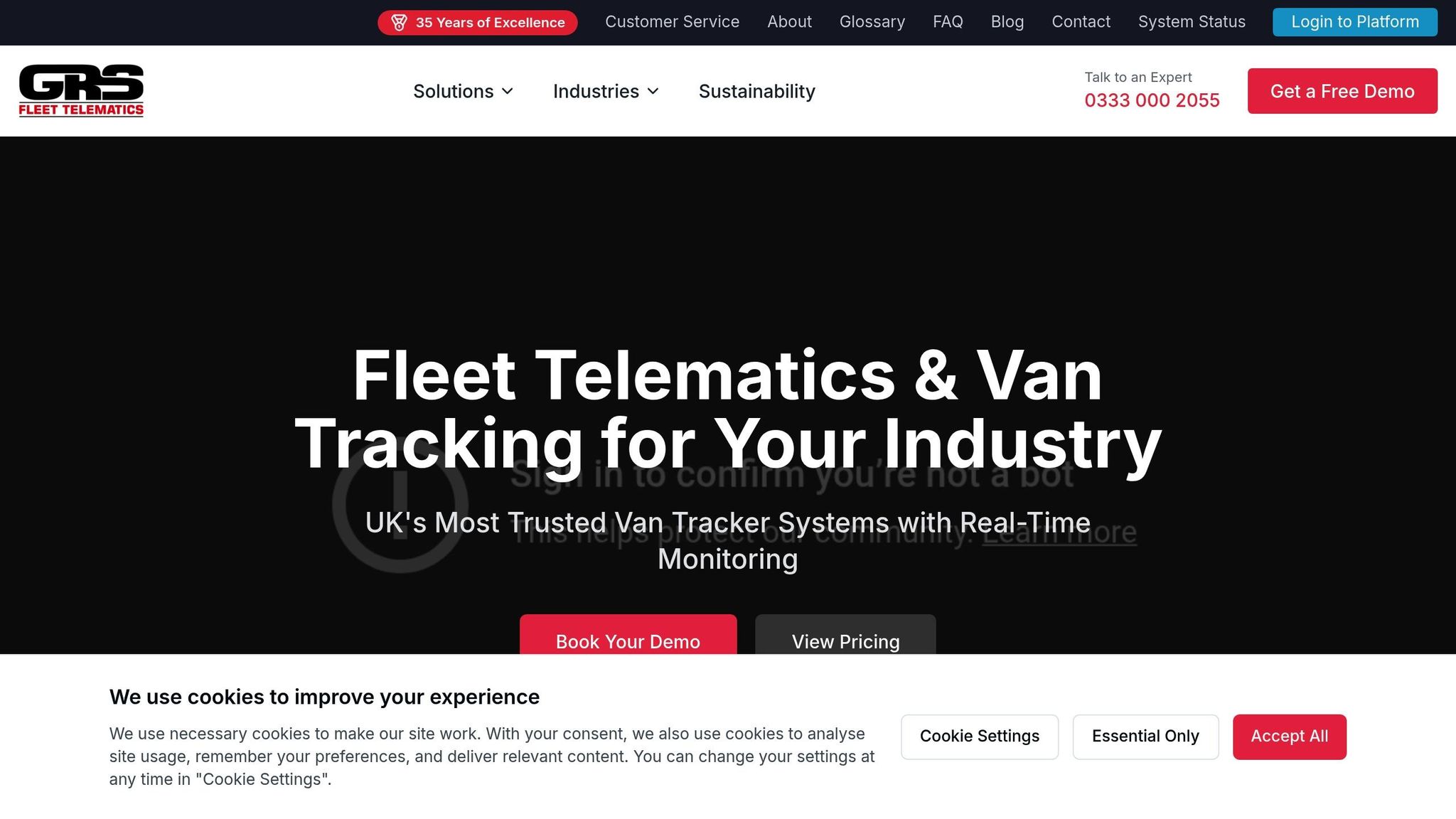
UK Fleet Tracking Compliance Requirements
Fleet operators in the UK face a host of regulatory obligations that go far beyond simple vehicle tracking. For instance, the Driver and Vehicle Standards Agency (DVSA) requires commercial fleets to use digital tachographs. These devices record driver hours and rest periods, ensuring compliance with legal standards. Additionally, keeping emissions in check is becoming a priority, with fleets expected to adhere to Euro VI standards and local Clean Air regulations. Modern telematics systems make compliance more manageable by automating data collection and reporting, which ensures GDPR-compliant record-keeping and reduces administrative workloads. This streamlined approach not only helps with regulatory adherence but also enhances overall fleet management efficiency.
GRS Fleet Telematics: Solutions for UK Businesses
GRS Fleet Telematics offers an advanced system featuring dual-tracker technology, which delivers exceptional security. This system has achieved an impressive 91% recovery rate for stolen vehicles. It combines a primary wired tracker with a secondary Bluetooth backup, ensuring uninterrupted monitoring even if the main device is tampered with.
Pricing is straightforward and transparent, starting at £7.99 per vehicle per month. This includes a SIM card, data costs, and full access to the platform. Hardware options range from £35 to £99, depending on your security needs. The pay-per-recovery model means you’re only charged a fee if a stolen vehicle is successfully recovered, aligning our priorities with your fleet’s safety.
GRS also offers free installation when combined with fleet branding services through GRS Fleet Graphics. The system includes features like driver safety analytics and eco-driving insights, which not only support compliance but also help with route optimisation, fuel savings, and cost control.
To top it off, our 24/7 recovery support ensures immediate assistance, with teams well-versed in local recovery protocols throughout the UK.
Conclusion: Selecting the Right Fleet Tracking Solution
Choosing between GPS trackers and telematics systems comes down to what your fleet truly needs, how complex your operations are, and what your long-term goals look like. If your main focus is real-time location tracking and basic security, GPS trackers might be the way to go. On the other hand, telematics systems offer a wealth of data and insights that extend far beyond simple location monitoring.
For smaller fleets or those that operate seasonally, basic GPS tracking can be a practical choice. Long-haul operations, however, often benefit from the compliance support and efficiency gains provided by telematics. Fleets with high vehicle turnover or rental operations might lean towards self-install GPS devices - they’re cost-effective and flexible. Meanwhile, companies prioritising safety, security, and data-driven strategies often prefer hardwired telematics systems installed by professionals for their advanced capabilities.
Budget is always a key factor. For instance, GRS Fleet Telematics offers advanced dual-tracker technology for just £7.99 per vehicle per month. This solution not only provides continuous monitoring but also boasts an impressive 91% recovery rate for stolen vehicles, even in cases of tampering.
For UK fleet operators, it’s critical to balance upfront costs with long-term benefits like efficiency and security. While GPS trackers cover the basics, telematics systems offer the deeper data insights, regulatory compliance support, and operational advantages needed to keep modern fleets competitive in today’s challenging transport landscape.
FAQs
How do I choose between GPS trackers and telematics systems for my fleet?
When deciding between GPS trackers and telematics systems, it all comes down to what your fleet needs. GPS trackers focus on providing real-time location updates, which makes them a great choice for straightforward tracking and security purposes. On the other hand, telematics systems go beyond just location tracking. They offer a wealth of data, including insights into vehicle performance, driver behaviour, and overall operational metrics.
Telematics systems shine when it comes to managing long-haul fleets. They can help with things like optimising routes, scheduling maintenance, and staying on top of compliance reports. If you're looking to boost efficiency, improve safety, and gain a deeper understanding of how your fleet operates, telematics might be the way to go. But, if your needs are simpler or you’re managing a smaller fleet, GPS trackers could be all you need.
Think about how much data and analysis your fleet requires to make the right choice for your business.
How do telematics systems improve fleet compliance and efficiency compared to basic GPS trackers?
Telematics systems take vehicle tracking to the next level, offering much more than just location data. Unlike basic GPS trackers, these systems provide real-time insights into how vehicles are performing, how drivers are behaving, and how routes can be made more efficient.
Key features include automated maintenance alerts, fuel consumption monitoring, and driver safety analysis. These tools not only help cut costs but also improve safety standards and ensure regulatory compliance. By integrating these capabilities, telematics systems simplify fleet operations, enhance productivity, and keep long-haul fleets running smoothly.
Which industries or fleet sizes are better suited to GPS trackers rather than telematics systems?
GPS trackers work well for smaller fleets or businesses looking for an affordable way to manage basic tracking and security needs. Sectors like local delivery services, tradespeople, or small-scale logistics operations can take advantage of real-time location tracking, better route planning, and theft prevention - without needing advanced analytics or in-depth diagnostics.
On the other hand, for larger fleets or industries that demand more detailed data, such as monitoring driver behaviour or analysing vehicle performance, telematics systems are usually the better choice. They offer a wider range of features and can handle the more complex demands of large-scale operations.

